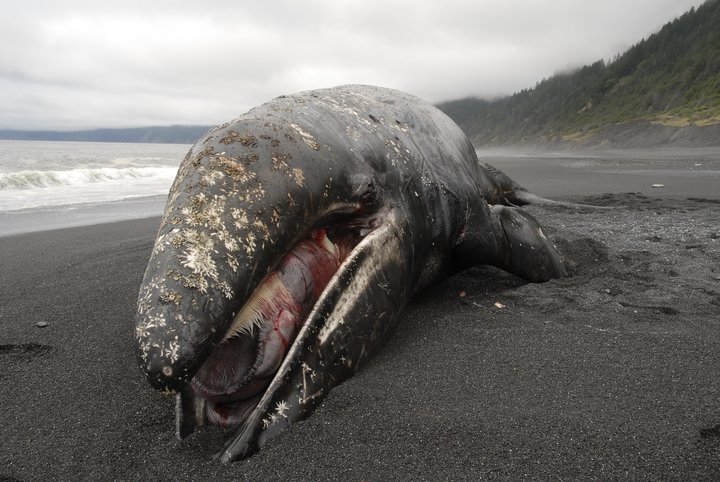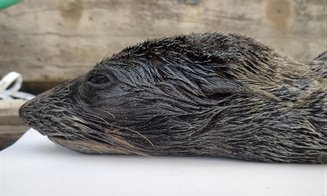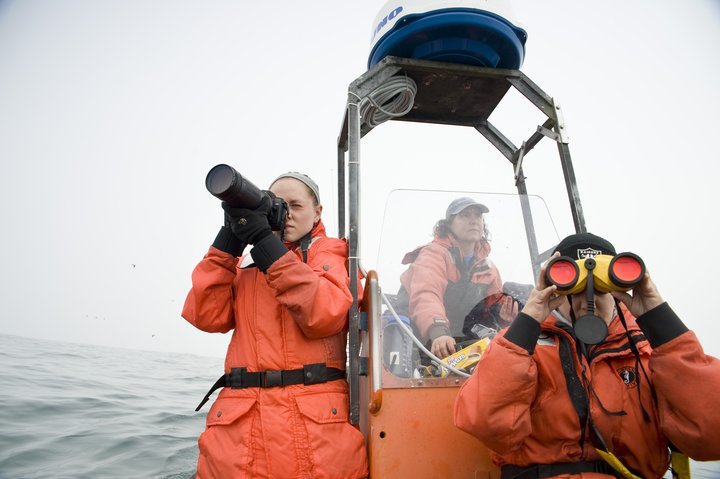
Gray whale. Photo: MMERP, Permit #18786-02.
###
The National Oceanic and Atmospheric Administration recently announced we are experiencing an “Unusual Mortality Event” here on the West Coast. According to NOAA data, there have been 77 gray whale strandings so far this year in California, Oregon, Washington and Alaska — 37 of them in California alone. Along the entire West Coast, from the tip of Baja to the top of Alaska, there have been 155 since the first of the year.
Dawn Goley is a professor of zoology at Humboldt State and the director of the Marine Mammal Education and Research Program, or MMERP for short. Goley said there are about 27,000 gray whales, which is a huge increase since the whale hunting days of bygone years where they were hunted to near extinction. Goley said high levels of mortality are expected in large populations, but “this year is above what we would expect.”
To help monitor the coast lines, Goley directs a group of about 25 student volunteers for MMERP. They hike the beaches from Mendocino County to southern Oregon once and sometimes twice a month looking for stranded marine mammals.
“We are looking for the normal patterns of stranding for dead marine mammals in this area,” Goley told the Outpost Tuesday afternoon. “When we find a stranded animal we try to understand the cause of death.”
According to Goley, changes in gray whale habitats affects the availability of their food.
“Death from emaciation/starvation on the northward leg of [their] journey in the late spring/early summer suggests they ‘ran out of fuel’ on the way back to the feeding grounds,” Goley said.
“There are major shifts in the Arctic ecosystem right now with the increased temperatures and faster than expected ice melting that could definitely impact the food base for gray whales.”

Guadalupe fur seal. Photo: MMERP, Permit #18786-02.
Humboldt County has seen two gray whale deaths this year, with one of them being in Trinidad and the other at the South Spit of Humboldt Bay. According to Goley these deaths are not out of the ordinary. However, what is out of the ordinary for this area, Goley said, are the number of dead Guadalupe fur seals that have been found since the beginning of the year, which is also considered a UME.
“In the last 15 years I think we have found six, and so far this year we have found nine in Mendocino, Humboldt and Del Norte counties,” Goley said. “Many of them are emaciated when they strand and haven’t got enough resources. And so now the push is to determine the cause of death and try to ascertain what the cause is based on — environmental or otherwise.”
Goley got her PhD from UC Santa Cruz and began teaching at HSU in 1996. She came here because of the university’s dedication to marine life studies and their support in understanding the natural history and ecology of the area.
“It’s such a huge rugged coast here,” Goley said. “In the Central Coast you can’t throw a rock and not hit somebody, pretty much every inch of beach is covered. But here, there are beaches that go months without anybody ever stepping foot on it.”
Back in mid-May, Goley and her students’ efforts were hindered when a research vessel that MMERP usually takes out was stolen from a shop in Redding. It may seem like quite the distance for the school to travel with the boat, but it is not without reason. It’s a retired Coast Guard rescue boat and the mechanic — also a Coast Guard retiree, Goley said — knows everything nook and cranny on the thing. Or at least he did before it was stolen.
The main hull was found through the work of the Redding Police Department, Goley said. She didn’t have the exact breakdown of everything that was stolen off the boat, but it included the main working parts — the engine, steering components, and most of the electrical.

Photo: MMERP, Permit #18786-02.
“We are kind of in a wait and see mode to see what will be replaced,” Goley said. “We are trying to see what we will be compensated for and then we will know what we will need to do to recover the funds to make [the boat] whole.”
The boat has been used to study marine mammals for the last 20 years and Goley said it’s been a challenge not having it this year since the summer is prime season for field work. One of the student volunteers with MMERP is Nicole Espinoza. Espinoza is a senior at HSU and moved here from Ventura County. She came here because of HSU’s zoology program and mainly covers the Samoa area during her beach walks for MMERP. According to Espinoza there are a number of things the student volunteers do when they find a stranded carcass, such as identifying the sex and age of the specimen.
“The experience teaches you field work and tests your knowledge in trying to find a cause of death and to find signs of human interaction,” Espinoza said. “Depending on how far the decomposition is it can be difficult, but we tag them to make sure its been found.”
In mid-May Espinoza found a Guadalupe fur seal carcass and collected the specimen for it to be studied at the HSU lab in more detail. She said trying to determine the cause of death at the beach can be difficult.
“If they are super scavenged and their organs are gone, then you can’t really tell what happened,” Espinoza said.
Just last week she came across a gray whale carcass that has been on the beach for some time. She said the carcass has been sitting in the sun for a while and is just a “pile of goo” now.
“Until Mother Nature wants it back, it just stays there,” Espinoza said.
MMERP also works with the National Marine Mammal Lab to track the population growth of the Steller sea lions. The main purpose of the study is to make sure their 2013 delisting from the Endangered Species List wasn’t premature. But when it came to putting an emphasis on anything during the interview with the Outpost, Goley wanted to stress what people should do if they come across a dead marine mammal.
1. Please keep a safe distance
2. Keep pets away
3. Call the HSU Marine Mammal Hotline (707-826-3650) or e-mail marinemammals@humboldt.edu as soon as you can. Please include a description of the animal and the exact location if possible to help us get to it quickly.
If you find a sick or injured marine mammal, please keep a safe distance and call the North Coast Marine Mammal Center with the same information as above — 707-951-4722 More information and an opportunity to donate to MMERP can be found here.
CLICK TO MANAGE